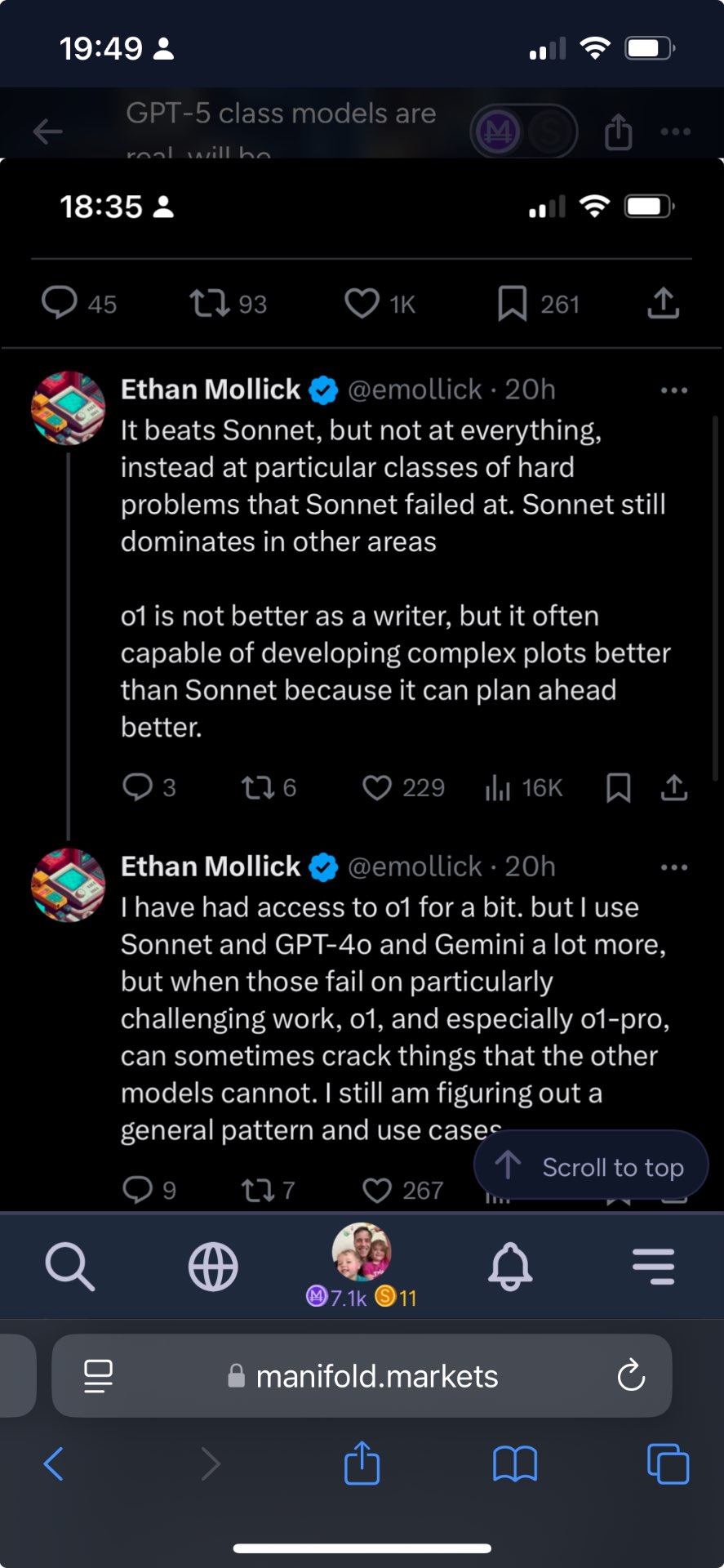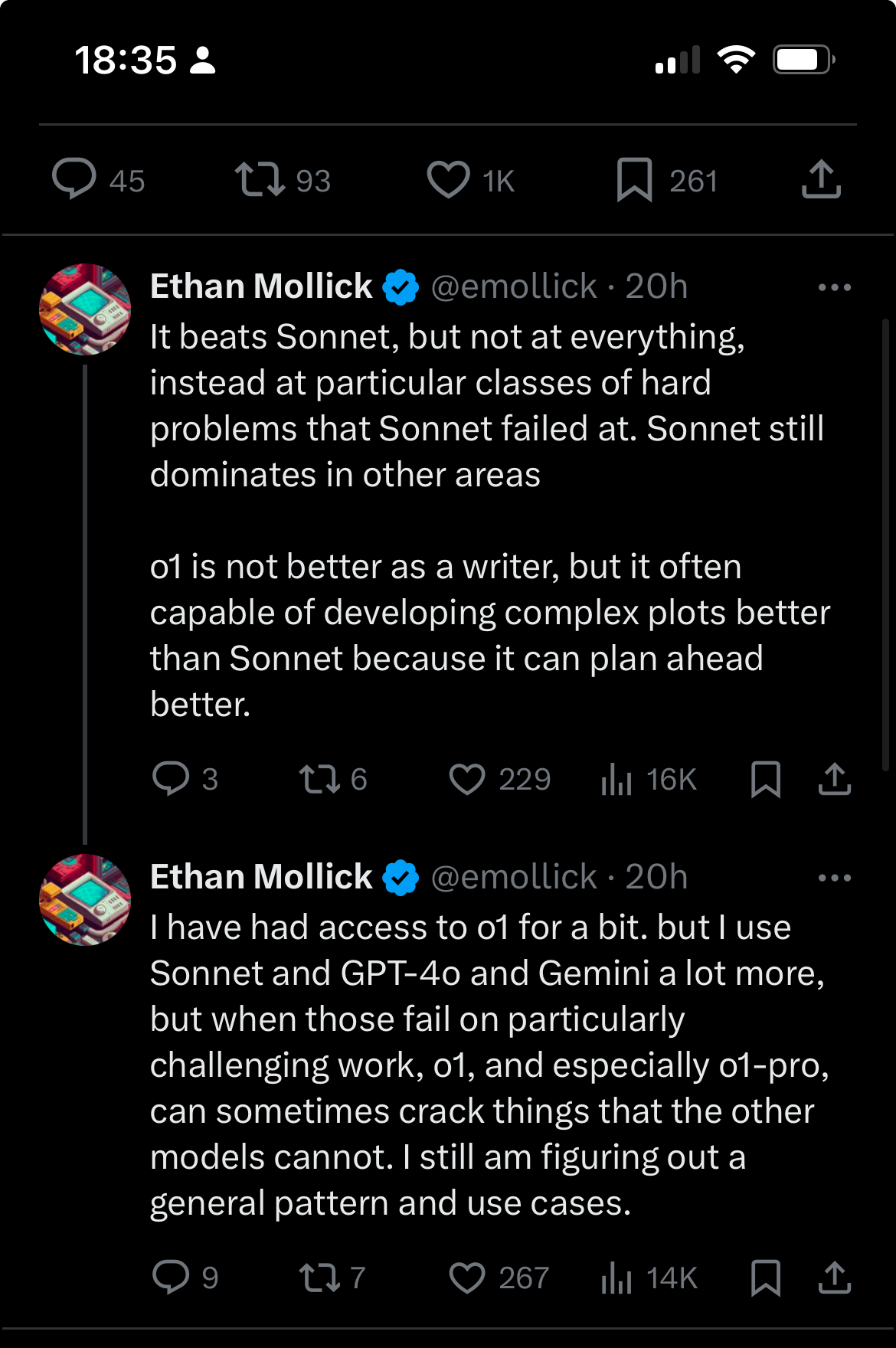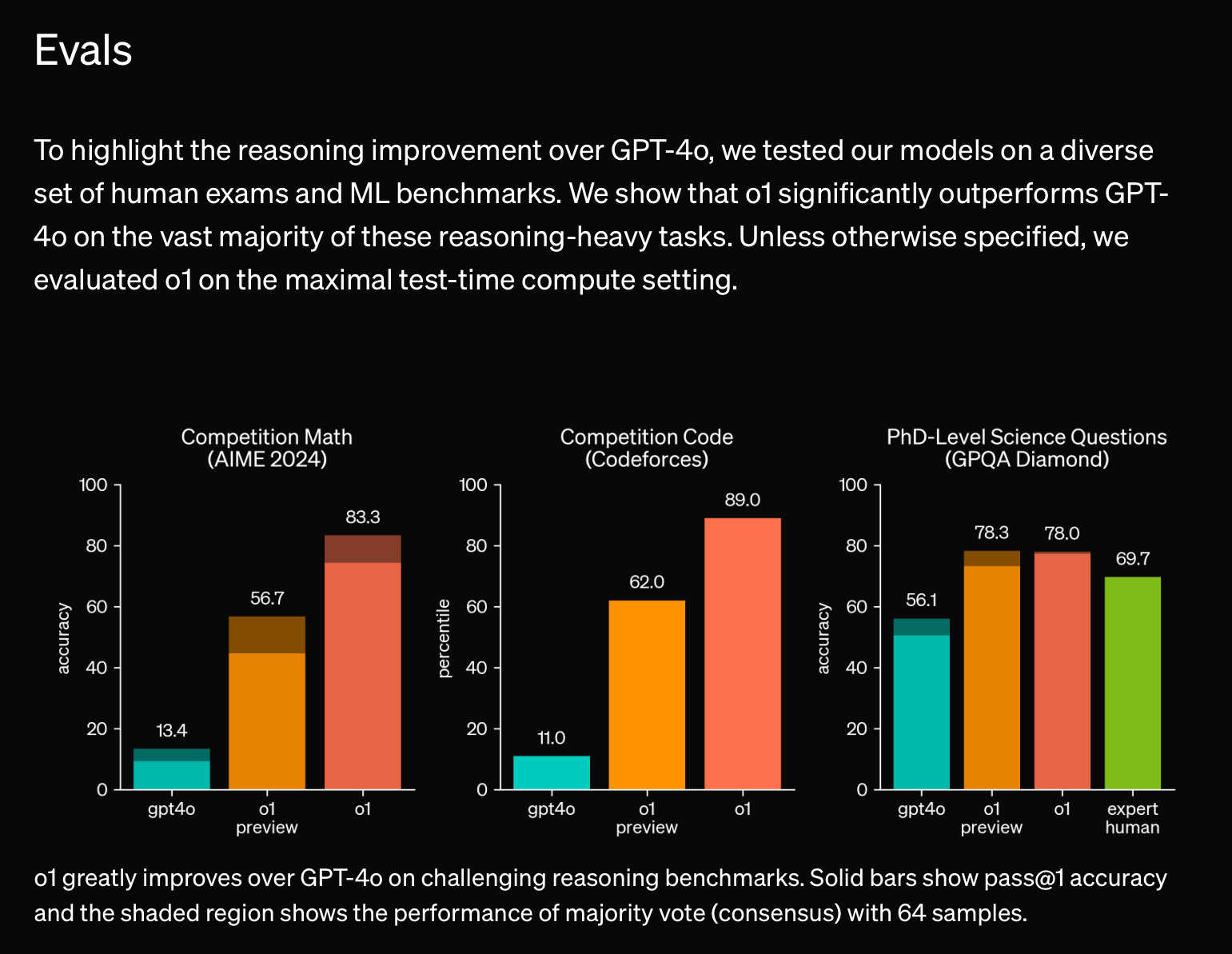
I’m going to do my best to make this rigorous. This one is a bit fuzzy but it’s what I want to know the answer to.
This will resolve to yes if:
by the end of the day on 12/31/2024
a new class of ai model is released by anyone (not just OpenAI). The model must be in wide availability. Some gates are acceptable (e.g., paid users only, 10% of users), but it cannot be available to selected AI influencers.
that is a step change better in performance. For clarity: GPT-4 was a step change better than 3/3.5 and would qualify; Claude 3.5/GPT 4o are narrowly better than GPT-4 and would not. I will use my best judgement to resolve this honestly using all inputs available (benchmarks, test cases, user reports, reviews by expert users).
Names don’t matter here. It could be called GPT-1 but if it’s obviously way better than GPT-4/Claude 3.5, then the market resolves to yes.
Given the ambiguity here, I will not be betting on this market.
This updates me higher on "step change" of capability: https://x.com/DeryaTR_/status/1865111388374601806
https://x.com/kimmonismus/status/1865118512764612958
This is absolutely not a dramatic improvement and may not be an improvement at all compared to Claude.
@ismellpillows I’m trying to figure out what to do with this

This more or less matches my experience - sometimes it’s way way better but other times it isn’t. I don’t recall having to qualify the step from 3.5 to 4 in the same way. 4 was just always better.
However I’m still thinking it over and I think with o1 being fully out I’ll get more information.
I see, some people’s experiences is that is it not always better than models like sonnet, whereas gpt-4 was always better than gpt-3.5. I’m curious which specific areas it is worse at.
The main way I judge models is on reasoning capability, which is what o1 class models are better at. People agree that o1 is much better at harder science and engineering problems for this reason. This is why I think it’s a “step change better”.
The main criticism I’ve seen is on the style of responses, writing, or code. I think when people compare models’ responses for easier problems, the main point of comparison is style. Style is dependent on reasoning capability up to a point, but after that point it is more dependent on the defaults of the model. And people prefer claude’s defaults over o1’s. But that doesn’t mean o1 is more incapable, and users can change style to their preference with a few sentences of prompting. (In fact, a model’s ability to change style from default is a sign of capability.)
Keep in mind sonnet is not gpt-4. On LLM arena leaderboard, gpt-4-0314 (the original gpt-4) is ~75 points above gpt-3.5. sonnet is already ~100 above gpt-4-0314, and o1-preview is ~50 above sonnet.
Also, afaik, the model they are offering as o1 is sometimes worse than o1-preview (similar to how gpt-4-0613 is ~25 points below gpt-4-0314). o1-pro is the real deal.
@ismellpillows I have been using it all day today alongside Claude for coding at my day job, and Claude has been better the whole time.
This is not some dramatic improvement for real world purposes (for my job, it is not an improvement at all.)
@DavidBolin could you give an example of a prompt and a comparison models’ responses? are you using o1-pro? are you using memory or a system prompt? trying to understand your general use case.
@ismellpillows
"How do I revise this React fragment so that the tooltip does not show up when you hover on "Add to Scratch Pad"? followed by React jsx.
Claude gives exact modifications.
o1 (no I have not paid $200 and won't although if they ever give a test period I'll try it) gave a generic description of how one would do it, although the code was right there.
Other cases were similar.
I see, so there’s a coding problem and you’d like the model to respond by writing code, which claude does and o1 doesn’t, right?
the way i see it, this is an example of what i previously called default “styles” of responses. claude defaults to writing code, o1 defaults to explanations instead, and you prefer claude’s default. (right?)
the reason i don’t think style the best way to compare models is that users can change the style from default to what they prefer, for example in this case by prompting “write code”. this applies to not preferring o1’s default writing style (eg listicles) or coding style. the user can change the style from default. having a certain default style doesn’t mean the model isn’t capable of other styles.
“capability” is what i think separates models. consider for example if we were to test models with the prompt “avoid writing code”. more capable models would follow this instruction better (but that may mean the style is actually less preferable). the best way to test capability is harder problems, which people agree o1 is much better at.
@JamesBaker3 Whew it's out now - feeling much more confident, doubled my position.
Here's Ethan Mollick, prolific AI reviewer and tester, today: https://x.com/emollick/status/1864871107095912767
@jdilla indeed. Given the inevitably of "the future never quite looks exactly as we envision it" I'm open to a resolve-to-percentage that aims to represent "mostly but not quite"
Okay folks, I'm starting to get back into a rhythm post baby and going to take a close look at o1 (at least this is what I tell myself).
Over the next several weeks, I'm going to make an assessment of o1 against the criteria above.
If you have reviews or analyses of it that you think are particularly persuasive, point me to them (I'll be looking at the ones in the comments as well).
Thanks for understanding on the delay. Timing could not have been worse!
@ismellpillows No.
I use it for work, and it is not substantially better than the others.
i.e. even if you can set up technical benchmarks where it is better, it is not much better for real world use cases. And that is absolutely not because there isn't a meaningful way to be substantially better for those cases; there certainly is, and I would recognize it if it happened.
@DavidBolin @ismellpillows fwiw, this is why I haven’t resolved the market yet.
On one hand the benchmarks look compelling but on the other hand I don’t see people flocking to it the way they did 4 (vs 3.5 and Claude).
I notice this both in my behavior and in the smart people I observe. So at the moment I’m trying to gather more information to make this more definitive and less of a pure judgement call.

